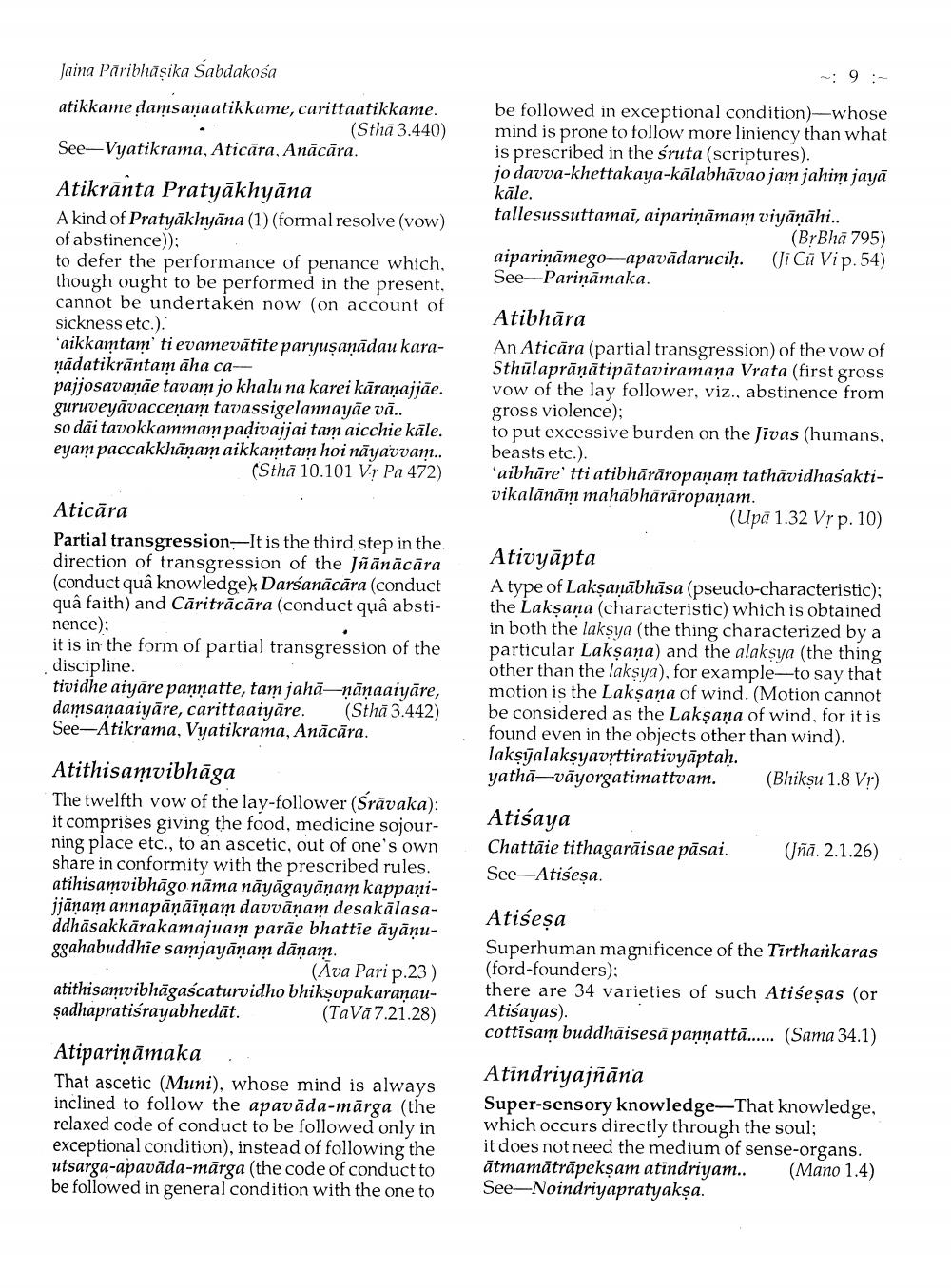________________
9
:
Jaina Pāribhāsika Sabdakosa atikkame damsaņaatikkame, carittaatikkame.
(Sthā 3.440) See-Vyatikrama, Aticāra, Anācāra. Atikrānta Pratyākhyāna A kind of Pratyākhyāna (1)(formal resolve (vow) of abstinence)); to defer the performance of penance which, though ought to be performed in the present, cannot be undertaken now (on account of sickness etc.). *aikkamtam' ti evamevātite paryuşanādau karaņādatikrāntam āha ca-- pajjosavaņāe tavam jo khalu na karei kāraṇajjäe. guruveyāvacceņam tavassigelannayāe vā.. so dāi tavokkammam padivajjai tam aicchie kāle. eyam paccakkhāņam aikkamtam hoi nāyavvam..
(Stha 10.101 Vr Pa 472)
be followed in exceptional condition-whose mind is prone to follow more liniency than what is prescribed in the śruta (scriptures). jo davva-khettakaya-kālabhāvao jam jahim jayā kāle. tallesussuttamai, aipariņāmain viyāņāhi..
(BrBhā 795) aipariņāmego-apavādarucih. (Ji Cũ Vip. 54) See-Pariņāmaka.
Atibhāra An Aticāra (partial transgression of the vow of Sthülaprāņātipātaviramana Vrata (first gross vow of the lay follower, viz., abstinence from gross violence); to put excessive burden on the Jivas (humans, beasts etc.). "aibhāre' tti atibhārāropanam tathāvidhasaktivikalānām mahābhārāropanam.
(Upā 1.32 Vịp. 10)
Aticāra Partial transgression-It is the third step in the direction of transgression of the Jñānācāra (conduct quâ knowledge, Darsanācāra (conduct quâ faith) and Cāritrācāra (conduct quâ abstinence); it is in the form of partial transgression of the discipline. tividhe aiyāre pannatte, tam jahā—ņāņaaiyāre, damsanaaiyāre, carittaaiyāre. (Sthā 3.442) See-Atikrama, Vyatikrama, Anācāra.
Ativyāpta A type of Laksaņābhāsa (pseudo-characteristic); the Laksana (characteristic) which is obtained in both the laksya (the thing characterized by a particular Laksana) and the alaksya (the thing other than the laksya), for example-to say that motion is the Laksana of wind. (Motion cannot be considered as the Laksana of wind, for it is found even in the objects other than wind). lakşyalaksyavrttirativyāptaḥ. yathā—vāyorgatimattvam. (Bhikṣu 1.8 Vr)
Atiśaya Chattāie tithagarāisae pāsai. See-Atiseşa.
(Jña. 2.1.26)
Atithisamvibhāga The twelfth vow of the lay-follower (Srāvaka); it comprises giving the food, medicine sojourning place etc., to an ascetic, out of one's own share in conformity with the prescribed rules. atihisamvibhāgo nāma nāyāgayāṇam kappanijjāņam annapāņāiņam davvānam desakālasaddhāsakkārakamajuam parāe bhattie āyāņuggahabuddhie samjayānam dāņam.
(Ava Pari p.23) atithisamvibhāgascaturvidho bhikṣopakaranauşadhapratisrayabhedāt. (TaVā7.21.28)
Atiśesa Superhuman magnificence of the Tirtharkaras (ford-founders); there are 34 varieties of such Atiśesas (or Atisayas). cottisam buddhāisesā pannattā...... (Sama 34.1)
Atipariņāmaka .. That ascetic (Muni), whose mind is always inclined to follow the apavāda-mārga (the relaxed code of conduct to be followed only in exceptional condition), instead of following the utsarga-apavāda-mārga (the code of conduct to be followed in general condition with the one to
Atindriyajñāna Super-sensory knowledge-That knowledge, which occurs directly through the soul; it does not need the medium of sense-organs. ātmamātrāpekşam atindriyam.. (Mano 1.4) See-Noindriyapratyakşa.




